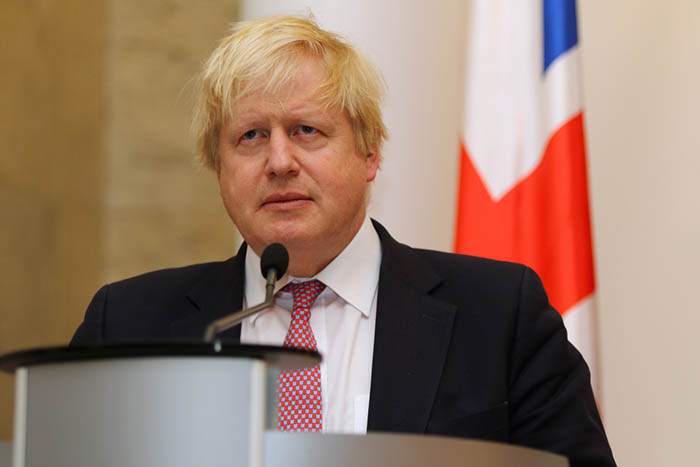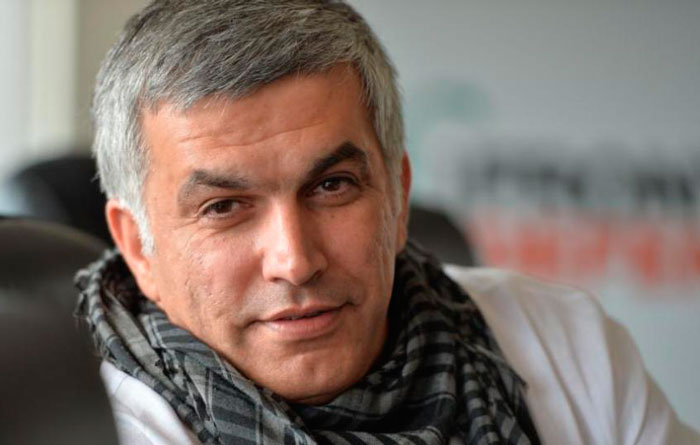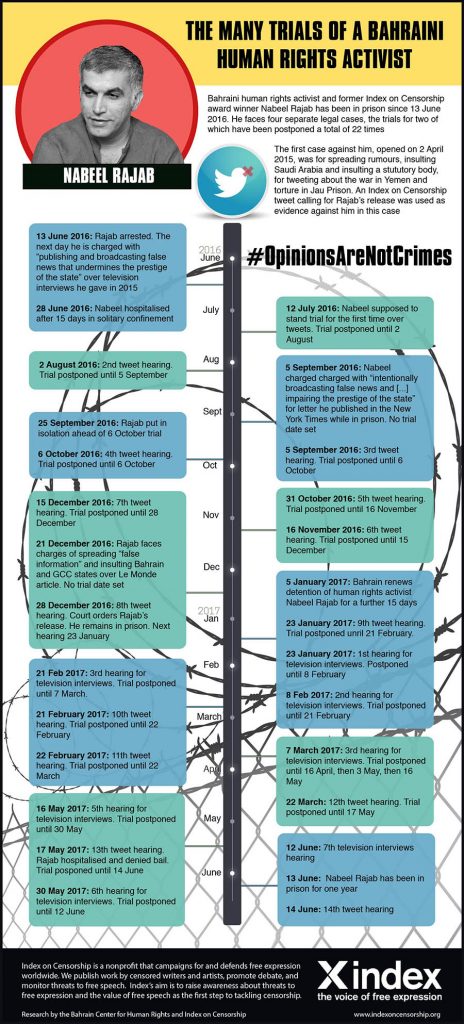4 Aug 2017 | Bahrain, Bahrain Statements, Campaigns -- Featured, Statements
[vc_row][vc_column][vc_column_text]
* Yusuf Al-Jamri made a plea to King Hamad about the torture he suffered at the hands of the National Security Agency on Thursday 3 August
* Immediately afterwards, the NSA summoned him for interrogations
* The NSA interrogated Yusuf three times this week, tortured him, and threatened him with rape
* The NSA is responsible for the torture and sexual assault of detainees including women’s rights defender Ebtisam Al-Sayegh
* The NSA was given arrest powers in January 2017. Its president is Sheikh Talal Al Khalifa, a Bahraini royal and Sandhurst graduate
The National Security Agency has summoned online activist Yusuf Al-Jamri for interrogation after he published a video message on Thursday 3 August to King Hamad of Bahrain accusing them of torturing him. The NSA is the subject of many recent torture allegations and is headed by Sheikh Talal Al Khalifa, a Bahraini royal and Sandhurst graduate.
Al-Jamri states in his message to King Hamad that the National Security Agency threatened him with rape and reprisals against his family, and insulted him and his faith. He says to the King, “Your Majesty, I was tortured. …The interrogator said that he acts with the highest authority after your Majesty’s, and nothing can stop him.”
Since publishing his message to the King at 6.26 PM (Bahrain time) on 3 August, Al-Jamri was immediately summoned to the NSA again.
The NSA repeatedly called Al-Jamri’s wife urging him to present himself at the Muharraq Security Complex. Al-Jamri shared images of the many calls on his Twitter.
Al-Jamri was summoned to for interrogation at the Muharraq Security Complex by the National Security Agency on 1st and 2nd August. The summons may have been because of his activism on social media. On 20 July, he put out a series of tweets publicising the UK’s criticisms of Bahrain’s human rights situation in the Foreign & Commonwealth Office’s Human Rights and Democracy report.
“Bahrain’s government routinely resorts to harassment to silence human rights defenders. The international community — especially the UK — must demand that Bahrain treats its citizens with respect and end threats of reprisals and outright torture,” Sean Gallagher, Index on Censorship, said.
Abuses by the National Security Agency
Human rights defender Ebtisam Al-Sayegh alleges she was tortured and sexually abused by NSA agents in May 2017. Amnesty International reported on her torture: “When she arrived [at Muharraq], she was immediately blindfolded, and in the subsequent hours, she was sexually assaulted, beaten all over her body, kicked in the stomach and kept standing for most of the seven hours she was being interrogated.”
Ebtisam Al-Sayegh told Amnesty: “The men told me ‘no one can protect you’. They took away my humanity, I was weak prey to them.”
On 3 July, Al-Sayegh was re-arrested. The family believes the NSA was responsible for the arrest. She remains in detention, and has been charged under the anti-terrorism law. She is at high risk of ill-treatment, and her health deteriorated significantly during her detention.
National Security Agency: Further Information
In January, the King of Bahrain empowered the NSA with law enforcement powers, reversing one of the only Bahrain Independent Commission of Inquiry (BICI) reforms his government had implemented.
Sheikh Talal bin Mohammad Al Khalifa was appointed Director of the NSA in August 2016. Sheikh Talal, a graduate of the Royal Military Academy Sandhurst, is the son of a former Minister of Interior and brother to Sheikh Fawaz, the ambassador in London.
The NSA has offices in the Muharraq Security Complex. BIRD has recorded a growing number of torture allegations and arbitrary detentions by the NSA since April 2017.
Systematic torture by the NSA in 2011 was recorded by the BICI and led to the stripping of their powers. In April 2011, businessman Karim Al-Fakhrawi was tortured to death in NSA custody.[/vc_column_text][/vc_column][/vc_row][vc_row][vc_column][vc_basic_grid post_type=”post” max_items=”12″ style=”load-more” items_per_page=”4″ element_width=”6″ grid_id=”vc_gid:1501848639305-96eb2c27-f595-4″ taxonomies=”716″][/vc_column][/vc_row]
21 Jul 2017 | Bahrain, Middle East and North Africa, News and features
[vc_row][vc_column][vc_column_text]
Index on Censorship welcomes UK foreign secretary Boris Johnson’s interest in human rights. The UK Foreign and Commonwealth Office’s 2016 Annual Human Rights Report, released on Thursday 20 July, highlights the UK’s work to promote human rights around the world and sets out a list of 30 “Human Rights Priority Countries”, including Bahrain, Iran, Russia and Saudi Arabia.
In the report preface, Johnson writes: “Human rights are not inimical to development and prosperity; the opposite is true. Freedom of speech, freedom of association, freedom to practice whatever religion you want and live your life as you please, provided you do no harm, are the essential features of a dynamic and open society.”
Index agrees wholeheartedly and acknowledges that the report features many valiant efforts, including, for the first time, a section dedicated to modern slavery – a top priority for the UK government.
But the report – issued on “take out the trash” day, the last of the parliamentary sessions before a seven-week recess – does not, as it claims, seem to aspire to the “passionate advocacy” of Charles James Fox, the British Whig statesman and anti-slavery campaigner.
Instead, Johnson offers a watered-down endorsement of human rights and his department’s understanding of advocacy is seriously flawed. To borrow the foreign secretary’s own words, this is “unthinkable for anyone inspired by the example of Charles James Fox”.
Take Bahrain, for example. While the report does go some way to criticising a handful of the country’s human rights violations, this is not done not in nearly strong enough terms, and you’d be forgiven for thinking these violations are blips in an otherwise rosy picture. This is, after all, a country which has only “restricted some civil liberties”.
“There was a mixed picture on human rights in Bahrain in 2016,” the discussion of the Persian Gulf kingdom begins. “Compared with the region, Bahrain remains progressive in women’s rights, political representation, labour rights, religious tolerance and institutional accountability.”
Firstly, this is a faulty comparison. Looking at the region as a whole serves only to make Bahrain look better than it actually is. Bahrain may have 15% representation of women in parliament, as the report highlights, but this cannot be described as progressive. As of 2014, the government of Saudi Arabia, not known for its feminism, was made up of 19.9% women.
In April 2016, a royal decree that increased the rights of women in Bahrain only passed through parliament scrutiny on a technicality. In March of that year, Bahrain detained human rights activist and blogger Zainab al-Khawaja along with her one-year-old son. She was released in May but fled the country out of fear of re-arrest.
While the report does go on to criticise the dissolving of the country’s main Shia opposition party, Al Wefaq, it remains a mystery why the report would first highlight political representation and religious tolerance as positives in Bahrain.
The country certainly does not have enough institutional accountability, and this is not something it should be commended on.
Even the brief mention of Bahraini human rights activist Nabeel Rajab, sentenced to two-years in prison just for speaking to journalists 10 days before the government’s report was released, only refers to Index award-winner as having been arrested. The sheer scale of Rajab’s case is not accounted for.
On 3 February a coalition of 21 groups and individuals, including Index on Censorship, urged Johnson to call for Rajab’s release. In the time since, the US state department has called for Rajab’s release and condemned his sentencing. The UK government so far has only “voiced its concern” in the weakest possible terms, and as yet has not acknowledged Rajab’s sentencing.
When Theresa May became prime minister of the UK, Bahrain was one of the first countries she visited. As new documents reveal, UK contractors visited the country 28 times in 12 months amid Bahrain’s ongoing human rights crackdown. In all, “UK government contractors have spent more than 650 days in Bahrain training prison guards, including officers at the notorious Jau prison where death-row inmates are held and allegedly tortured,” the Middle East Eye reported earlier this month.
The UK government appears to be in no position to heap praise on Bahrain for strengthening the rule of law, justice reform, its independent human rights institutions, prisoners’ rights and improvements at Jau.
Many more issues in the Annual Human Rights Report must be scrutinised when MPs return in September. If the Bahrain section is anything to go by, the report should be found to fall far short of being “passionate” about human rights.
[/vc_column_text][/vc_column][/vc_row][vc_row][vc_column][vc_basic_grid post_type=”post” max_items=”4″ element_width=”6″ grid_id=”vc_gid:1500646119465-139983e0-dcda-4″ taxonomies=”716″][/vc_column][/vc_row]
10 Jul 2017 | Bahrain, Bahrain Statements, Campaigns, Campaigns -- Featured, Statements
[vc_row][vc_column][vc_column_text]The sentencing of Nabeel Rajab, an Index Freedom of Expression Award winner for his work defending human rights in Bahrain, underscores the decline of freedom of expression in the Gulf country.
Rajab was sentenced on Monday 10 July to two years in prison for speaking to journalists.
“The decision to sentence Nabeel to two years in prison reiterates the draconian approach Bahrain’s government takes toward non-violent dissent. This is a true miscarriage of justice that strips bare even the veneer of legality that Bahraini authorities like to show the rest of the world. Nabeel expressed opinions about the state of his own country and should not be penalised for free speech,” Melody Patry, head of advocacy at Index on Censorship, said.
Rajab, who is president of the Bahrain Center for Human Rights, was sentenced in absentia. He has been hospitalised since April.
Arrested on 13 June 2016, Rajab has spent the last year in pre-trial detention, largely in solitary confinement and deplorable conditions.
Rajab also faces trial on 7 August in a separate case related to his tweeting against the Saudi coalition’s war in Yemen, which Bahrain is part of, as well as speaking out against torture in Bahraini prisons. He faces up to 15 years in prison on other charges, according to the Bahrain Institute for Rights and Democracy.[/vc_column_text][/vc_column][/vc_row][vc_row][vc_column][vc_single_image image=”94125″ img_size=”full”][vc_basic_grid post_type=”post” max_items=”12″ style=”load-more” items_per_page=”4″ element_width=”6″ grid_id=”vc_gid:1499705443530-4f8668e7-7a47-7″ taxonomies=”3368, 716″][/vc_column][/vc_row]
6 Jul 2017 | Bahrain, Bahrain News, Middle East and North Africa, News and features
[vc_row][vc_column][vc_column_text]
The trial of Bahraini human rights activist Nabeel Rajab has been delayed yet again. He was due to stand trial on Sunday 2 July, but this was postponed until 3 July and again until 10 July.
Rajab, president of the Bahrain Center for Human Rights and Index award winner, was arrested on 13 June 2016 and remains in prison despite a court order to release him on 28 December 2016. He faces four separate legal cases, the trials for two of which have been postponed over 20 times.
“We are particularly concerned about Rajab’s health, which continues to deteriorate due to the poor conditions and mistreatment he receives in prison,” said Melody Patry, head of advocacy at Index on Censorship. On 5 April 2017, Rajab underwent major surgery at a military hospital to remove ulcerated tissue from his lower back. He was returned to his cell at East Riffa Police Station two days later against medical recommendations.
“My father’s fate is unknown. He might end up in a prison cell for the next 18 years, so it’s difficult and tiring for him and for our family,” Rajab’s son Adam Rajab told Index today. “However, that does not mean he will ever stop his struggle for rights and freedom.”
“We all know that my father will be released if he guarantees them that he will be silent, but he will not,” Adam added. “He will always be a voice for the victims of human rights abuses and he will always stand against oppressors and dictators. As he always says ‘I am willing to pay the price for freedom and democracy.'”
Index continues to express concern over the treatment of many human rights defenders in Bahrain including women’s rights activist Ebtisam Al-Sayegh, who this week was arrested following a raid on her home and now risks being tortured. [/vc_column_text][/vc_column][/vc_row][vc_row][vc_column][vc_column_text] [/vc_column_text][/vc_column][/vc_row][vc_row][vc_column][vc_basic_grid post_type=”post” max_items=”6″ element_width=”6″ grid_id=”vc_gid:1499332927690-0ca55f53-22f9-3″ taxonomies=”3368″][/vc_column][/vc_row]
[/vc_column_text][/vc_column][/vc_row][vc_row][vc_column][vc_basic_grid post_type=”post” max_items=”6″ element_width=”6″ grid_id=”vc_gid:1499332927690-0ca55f53-22f9-3″ taxonomies=”3368″][/vc_column][/vc_row]




 [/vc_column_text][/vc_column][/vc_row][vc_row][vc_column][vc_basic_grid post_type=”post” max_items=”6″ element_width=”6″ grid_id=”vc_gid:1499332927690-0ca55f53-22f9-3″ taxonomies=”3368″][/vc_column][/vc_row]
[/vc_column_text][/vc_column][/vc_row][vc_row][vc_column][vc_basic_grid post_type=”post” max_items=”6″ element_width=”6″ grid_id=”vc_gid:1499332927690-0ca55f53-22f9-3″ taxonomies=”3368″][/vc_column][/vc_row]